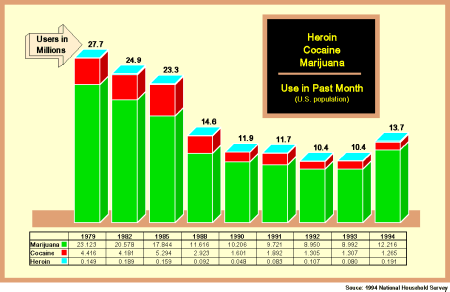![]()
DRCNet Reponse to the
Drug Enforcement Administration
Speaking Out Against Drug Legalization
DEA Statement |
Response |
|
| Legalization advocates claim that drug prohibition is akin to alcohol prohibition earlier this century. | It clearly is. For a good example of how much they are alike, see The Wickersham Commission Report on Alcohol Prohibition | |
| Their main premise is that it is impossible to
prohibit people from using substances that they want to use.
|
This is also clearly true, as the DEA's own evidence shows. | |
| Participants in the Anti-Legalization Forum felt
that legalization opponents should point to the successes of Prohibition and to stress
continuously the positive progress that has been made between 1979 and 1994 in reducing
levels of drug abuse.
|
The DEA is again distorting the issue. Their own
figures show that any drop in drug use (if it did, in fact, occur) were in the numbers of
casual drug users. The number of hard-core addicts -- the real problem -- was essentially
unchanged during that time period. It is also interesting to note that when the numbers of casual drug users is apparently going down, the DEA wants to claim that it was all due to their prohibition. When the numbers recently went back up, they claimed that we have to do more of the same. |
|
| When the Volstead Act was repealed, arrests for alcohol traffickers disappeared, but arrests in alcohol-related incidents rose, indicating that the prohibition against alcohol had kept people from using it. | Again, the DEA is ignoring the evidence. All major authorities agree that alcohol use began to decline two or three years before Prohibition went into effect (1920) and continued to decline until about 1922. Use and related problems rose every year thereafter until, by the end of Prohibition, rates of use were very close to the figures before Prohibition. See The History of Alcohol Prohibition, for example. | |
| The same will happen if drugs are legalized. Once drug use is sanctioned by the Government, more people will use drugs. | This simply isn't true, as shown by the experience in the Netherlands, where pot is sold openly and rates of use by teens are only a fraction of the rates of use in the United States. | |
| It is also important to remember that after Prohibition was repealed, organized crime branched out into other areas | There is no doubt that ending alcohol Prohibition produced a significant drop in the funding and criminal activity of organized crime. That was one of the major reasons it was ended. | |
| , and there is every expectation that current drug organizations would also continue and diversify. | This is a curious argument. What the DEA is
saying is that we must keep these people employed as drug dealers because, if we didn't,
they might do something worse. Therefore, drug prohibition is really an employment program
for criminals. It should be obvious to even the most casual observer that no other criminal trade offers the easy work and extreme profits of illegal drugs. |
|
| Some facts which help to confirm the observations of the
forum participants may be used in debates:
|
||
|
As stated above, consumption dropped during
the first couple of years of Prohibition and rose every year thereafter. It should also be noted that the American public agreed overwhelmingly that any drop in alcohol consumption was simply not worth the price that was paid in other respects. In short, Prohibition didn't work. See, for example: |
|
|
Mr. Peterson and the DEA give no references
to back up this statement. It should also be noted that alcohol consumption was clearly rising throughout most of the years of Prohibition and only continued the rise that was already in progress. It must also be noted that it is not the "consumption" of alcohol which is the real problem -- as shown by all the citizens who enjoy an occasional glass of beer or wine. It is the abuse of alcohol which is the problem -- and the DEA is singularly unable to distinguish between use and abuse. |
|
|
So do nearly all the other illegal drugs.
See, for example: History of the Medical Use (of marijuana) History of the Intoxicant Use (of marijuana)
|
|
| The DEA is inadvertently demonstrating the real reasons that these drugs were made illegal -- because of hostility to people with different cultures. See, for example: | ||
| This is also a strange argument because the DEA is saying that drug prohibition should be based on popularity. That is, if any of these drugs should become more popular, so there are a greater number of users, then we should (apparently) legalize drugs. If that is the case, then the DEA should be prepared to tell us what percentage of people must use drugs before they suddenly become legal. | ||
|
This is also true of every other drug. The best example is marijuana. For an interesting discussion of how alcohol is similar to an illegal drug, see Alcohol and Barbiturates, Two Ways of Getting Drunk. See also, Marihuana Use and Its Effects | |
|
By their own figures, they are not making any progress in reducing the number of hard-core addicts -- where the problem really is. | |

Travel back to the DRCNet Response to the DEA Home Page
Travel back to the Table of Contents
Travel back to The Ten Claims